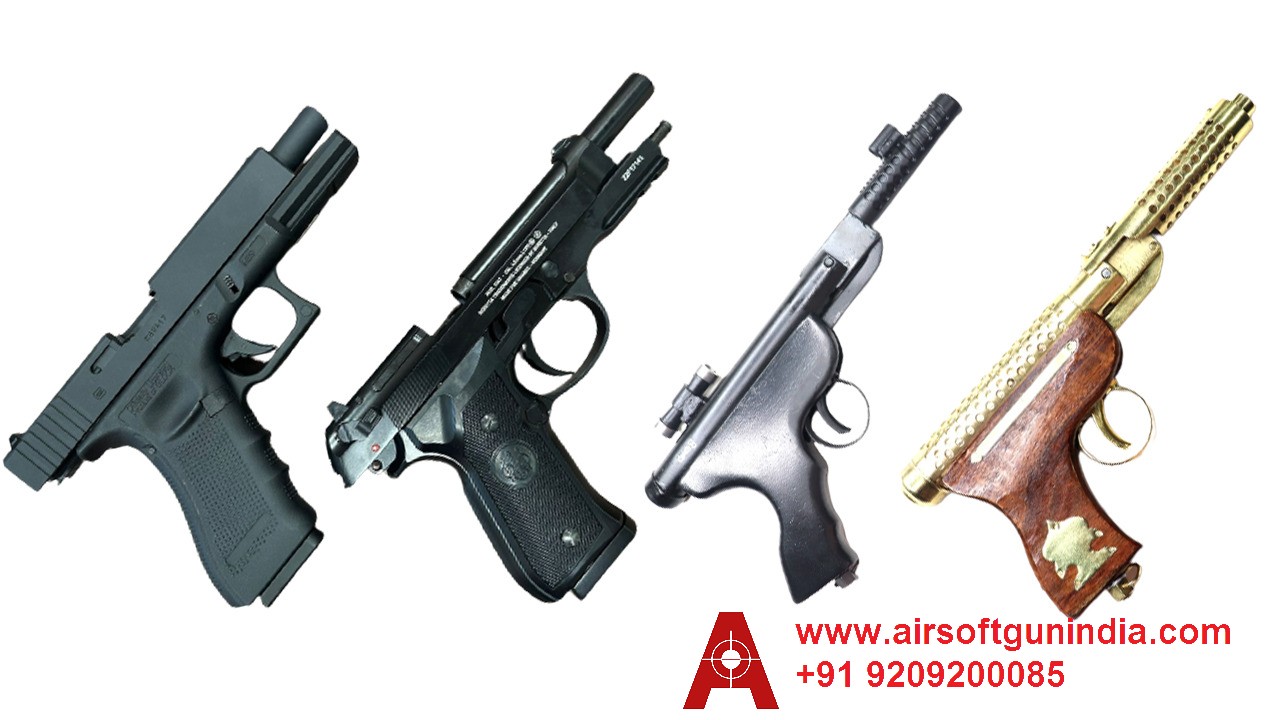CO2 .177 Air Guns vs .177 Spring-Powered Air Guns: Which is Right for You?
If you're a shooting enthusiast or just looking to have some recreational fun, choosing the right air gun can be a critical decision. Among the various types of air guns available, CO2 .177 air guns and .177 spring-powered air guns are two popular options. Both offer unique advantages and suit different shooting preferences. In this blog, we will explore the key differences between these air gun types, including their structures, price range, build, velocity, look, feel, mechanism, types of buyers, and places of availability, and help you determine which is the right choice for you based on your needs and preferences.
The difference in Structure:
- CO2 .177 Air Guns: These air guns are powered by CO2 cartridges, which provide the propellant for shooting projectiles. They often resemble real firearms, including replicas of famous models like Beretta, Glock, or Colt. The cartridges are inserted into the gun, and with each shot, the CO2 is released, allowing for multiple rounds to be fired without manually cocking the gun.
- .177 Spring-Powered Air Guns: These air guns rely on a spring mechanism for power. They have a break barrel or side lever design, where you manually compress a spring by cocking the gun before each shot. When the trigger is pulled, the spring releases, propelling the pellet forward.
The difference in Price Range:
- CO2 .177 Air Guns: Generally, CO2 air guns are priced in the mid to high range. The cost of CO2 cartridges should also be considered, as they need to be replaced regularly.
- .177 Spring-Powered Air Guns: Spring-powered air guns tend to be more affordable, with a wider range of options available to suit various budgets.
The difference in Built:
- CO2 .177 Air Guns: These guns often feature a mix of metal and plastic construction, with some models offering a more realistic weight and feel due to the metal components.
- .177 Spring-Powered Air Guns: Spring-powered air guns are predominantly built with metal barrels and receivers, providing durability and a solid feel.
The difference in Velocity:
- CO2 .177 Air Guns: CO2 air guns typically offer higher velocities compared to spring-powered air guns. The CO2 propulsion system provides consistent power, resulting in faster projectile speeds.
- .177 Spring-Powered Air Guns: Spring-powered air guns generally have slightly lower velocities, but they still offer adequate power for various shooting activities.
The difference in Look and Feel:
- CO2 .177 Air Guns: CO2 air guns are often designed as replicas of real firearms, providing an authentic look and feel. This makes them popular among collectors and enthusiasts seeking a realistic shooting experience.
- .177 Spring-Powered Air Guns: Spring-powered air guns might not have the same level of realism in design as CO2 models, but they still offer a satisfying shooting experience.
The difference in Mechanism:
- CO2 .177 Air Guns: CO2 air guns utilize a semi-automatic or revolver-style firing mechanism, allowing for quicker follow-up shots. Some models also have blowback features that mimic the recoil of a real firearm.
- .177 Spring-Powered Air Guns: Spring-powered air guns are typically single-shot, requiring manual cocking before each shot. This slower rate of fire may be suitable for some shooters seeking precision and focus.
The Difference in Types of Buyers:
- CO2 .177 Air Guns: These air guns attract collectors, enthusiasts, and individuals interested in replica firearms. They are also favored by those seeking semi-automatic or revolver-style shooting experiences.
- .177 Spring-Powered Air Guns: Spring-powered air guns are well-suited for beginners, recreational shooters, and individuals looking for budget-friendly options.
The difference in Places of Availability:
- CO2 .177 Air Guns: CO2 air guns, especially realistic replicas, are often available at specialized air gun stores, authorized dealers, and online air gun retailers.
- .177 Spring-Powered Air Guns: Spring-powered air guns are widely available at sporting goods stores, general retailers, and online platforms.
Which is Right for You?
- Choosing between CO2 .177 air guns and .177 spring-powered air guns depends on your shooting preferences, budget, and purpose. Consider the following factors to make the right decision:
- Shooting Style: If you desire a semi-automatic or revolver-like experience with faster follow-up shots, CO2 air guns may be your preference. On the other hand, if you enjoy the challenge of manual cocking and a slower rate of fire, spring-powered air guns might be a better fit.
- Budget: If you have a limited budget, a .177 spring-powered air gun can provide a cost-effective option while still delivering a satisfying shooting experience.
- Realism: If you're a collector or enjoy replica firearms, CO2 .177 air guns offer a wide range of realistic options.
- Shooting Purpose: For recreational plinking, target shooting, or introducing beginners to shooting sports, both types can be suitable. However, for precision shooting or small games, the consistent power of CO2 air guns might be advantageous.
- Age Group: Both CO2 and spring-powered air guns can be enjoyed by shooters of various ages. However, adult supervision is essential for younger shooters, and parents should consider the appropriate age for handling air guns responsibly.
In conclusion, both CO2 .177 air guns and .177 spring-powered air guns have their merits, and the right choice depends on your individual preferences and shooting goals. Consider the factors mentioned above, and you'll be better equipped to select the perfect air gun that brings joy and excitement to your shooting experience. Always prioritize safety, follow local regulations, and enjoy the thrill of shooting responsibly.
